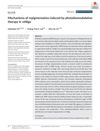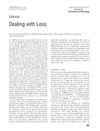36 citations,
April 2010 in “The journal of investigative dermatology/Journal of investigative dermatology” Canine hair follicles have stem cells similar to human hair follicles, useful for studying hair disorders.
 April 2012 in “Informa Healthcare eBooks”
April 2012 in “Informa Healthcare eBooks” Lichen planopilaris is a rare, chronic condition causing hair loss, mainly in middle-aged women, and early treatment is important to prevent permanent baldness.
 81 citations,
November 2012 in “Journal of the National Cancer Institute”
81 citations,
November 2012 in “Journal of the National Cancer Institute” The tumor suppressor gene FLCN affects mitochondrial function and energy use in cells.
 1 citations,
January 2015 in “Journal of nutrition & health”
1 citations,
January 2015 in “Journal of nutrition & health” Fish oil improves skin health in people with diabetes and high cholesterol.
 53 citations,
October 2014 in “Free radical biology & medicine”
53 citations,
October 2014 in “Free radical biology & medicine” Defective mitochondrial DNA replication causes aging symptoms and increased oxidative damage in mice.
 64 citations,
November 2012 in “EMBO reports”
64 citations,
November 2012 in “EMBO reports” Lamins are vital for cell survival, organ development, and preventing premature aging.
 21 citations,
January 2019 in “Experimental dermatology”
21 citations,
January 2019 in “Experimental dermatology” Light therapy using helium-neon lasers can help restore skin color in vitiligo by promoting skin cell growth and movement.
 March 2024 in “Journal of Investigative Dermatology”
March 2024 in “Journal of Investigative Dermatology” People with Primary Cicatricial Alopecia have a higher risk of heart disease.
 October 2023 in “The Journal of clinical endocrinology and metabolism/Journal of clinical endocrinology & metabolism”
October 2023 in “The Journal of clinical endocrinology and metabolism/Journal of clinical endocrinology & metabolism” Hyperandrogenism increases heart disease risk in premenopausal women, but this risk is linked to obesity in postmenopausal women.
 47 citations,
June 2014 in “Journal of Dermatological Treatment”
47 citations,
June 2014 in “Journal of Dermatological Treatment” Most treatments for lichen planopilaris were found to be generally unsatisfactory.
 June 2023 in “Journal of biological chemistry/The Journal of biological chemistry”
June 2023 in “Journal of biological chemistry/The Journal of biological chemistry” Sdr16c5 and Sdr16c6 genes regulate a key point in lipid production that affects eye and skin gland function.
 58 citations,
November 2020 in “International Journal of Molecular Sciences”
58 citations,
November 2020 in “International Journal of Molecular Sciences” SHBG may be a useful early indicator and treatment target for PCOS.
24 citations,
April 2008 in “Fertility and sterility” Pioglitazone improved insulin sensitivity and altered cortisol metabolism in PCOS patients.
6 citations,
August 2020 in “Cell regeneration” Hair follicle stem cells are similar to bone marrow stem cells but are better for fat cell research.
 4 citations,
July 2019 in “Children (Basel)”
4 citations,
July 2019 in “Children (Basel)” The review concludes that more research is needed to better improve the health outcomes for people with Polycystic Ovarian Syndrome.
 98 citations,
February 2013 in “Journal of The American Academy of Dermatology”
98 citations,
February 2013 in “Journal of The American Academy of Dermatology” Dutasteride may help stabilize Frontal Fibrosing Alopecia, but more research is needed.
 73 citations,
August 2011 in “Stem Cell Research”
73 citations,
August 2011 in “Stem Cell Research” Human hair follicle stem cells can turn into multiple cell types but lose some of this ability after being grown in the lab for a long time.
 45 citations,
April 2019 in “International Immunology”
45 citations,
April 2019 in “International Immunology” The study concluded that immune cells attacking hair follicles cause hair loss in alopecia, with genetics and environment also playing a role, and highlighted the potential of certain treatments.
 7 citations,
March 2011 in “Hormone and Metabolic Research”
7 citations,
March 2011 in “Hormone and Metabolic Research” Certain gene variations might help protect against insulin resistance and glucose intolerance in people with Polycystic Ovary Syndrome.
51 citations,
October 2019 in “Cells” Baricitinib reduces inflammation and improves cell health in premature aging cells.
 2 citations,
March 2011 in “Journal of Cutaneous Pathology”
2 citations,
March 2011 in “Journal of Cutaneous Pathology” The document suggests simplifying alopecia diagnosis and improving techniques for better accuracy.
 1540 citations,
October 2008 in “Fertility and Sterility”
1540 citations,
October 2008 in “Fertility and Sterility” The report concludes that PCOS is mainly a condition of excess male hormones and its definition may change as new information is discovered.
 December 2023 in “Regenerative therapy”
December 2023 in “Regenerative therapy” miRNA-based therapies show promise for treating skin diseases, including hair loss, in animals.
 295 citations,
September 2006 in “Cell Cycle”
295 citations,
September 2006 in “Cell Cycle” The conclusion is that using drugs to block the TOR pathway might slow aging and prevent age-related diseases.
136 citations,
September 2019 in “Journal of Clinical Investigation” Dermal adipose tissue in mice can change and revert to help with skin health.
 21 citations,
March 2018 in “Experimental Dermatology”
21 citations,
March 2018 in “Experimental Dermatology” The guide explains how to study human skin fat cells and their tissue, aiming to improve research and medical treatments.
4 citations,
September 2021 in “Sensors” LED therapy can safely and effectively regrow eyebrows in people with frontal fibrosing alopecia.
 5 citations,
October 2021 in “Frontiers in Cell and Developmental Biology”
5 citations,
October 2021 in “Frontiers in Cell and Developmental Biology” Fat tissue under the skin affects hair growth and aging; reducing its inflammation may help treat hair loss.
 9 citations,
May 2021 in “Frontiers in Cell and Developmental Biology”
9 citations,
May 2021 in “Frontiers in Cell and Developmental Biology” DNA methylation changes in women with PCOS could be used as disease markers and suggest new treatment targets.
 14 citations,
April 2019 in “International Journal of Women's Health”
14 citations,
April 2019 in “International Journal of Women's Health” Some treatments can stabilize Frontal Fibrosing Alopecia, but more research is needed to find effective treatments, and hair transplants often fail.























